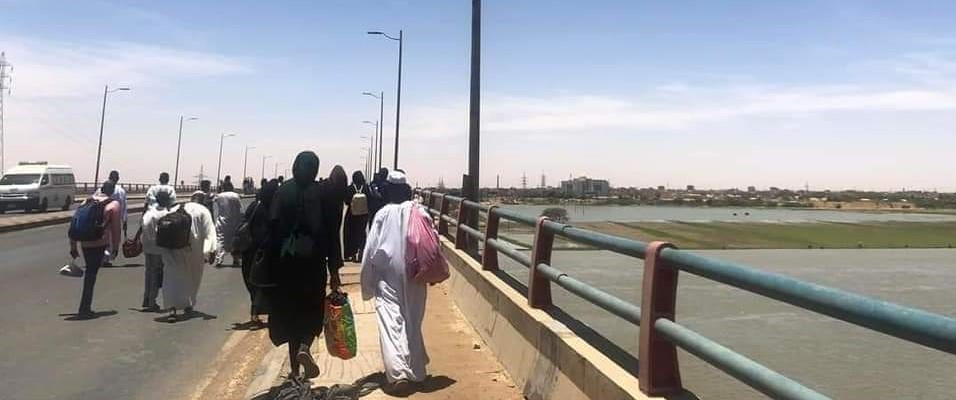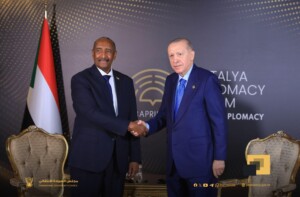Fighting continues in Sudan capital, UN warns for collapse of health system

People fleeing Omdurman (Social media)
KHARTOUM / NEW YORK –
Fighting between the Sudanese army and the paramilitary Rapid Support Forces (RSF) continued in central Khartoum and in a number of neighbourhoods in Omdurman yesterday and in the early morning. UN agencies warn of a collapse of the health system in the country. Sudanese women in the country and abroad demand an immediate end to the war.
Despite a 72-hour ceasefire, unilaterally announced by the RSF this morning, the first day of the Eid El Fitr, reports reached Radio Dabanga about continued shooting and shelling near the General Command of the Sudan Armed Forces (SAF), the Republican Palace, and the area south of Khartoum International Airport.
Omdurman witnessed heavy fighting on Thursday. A Radio Dabanga correspondent said that the battles continued in the south-western parts of Omdurman, in El Fitihab, Medinet El Nakhil, El Bustan, and on the Libya Market Road, on Thursday morning.
Lawyer Salaheldin Hashim on Thursday reported a heavy presence of RSF paramilitaries in the main streets surrounding the neighbourhoods of El Mohandesin, Medinet El Nakhil, Ombadda Blocks 18 and 19, Aburiyal, and El Salha.
“Army and RSF soldiers are concentrated inside the neighbourhoods. The gunfights this morning caused great fear among the people,” he said. “The exodus of people continues. Many people now flee to safer areas in Khartoum, where they also hope to find water and other basics of life.”
“The RSF modus operandi is hit and run, in a city the size of Khartoum they also play hide and seek, by setting up their units in residential areas they’ve effectively taken a large civilian population hostage exposing them to the ruthless response from the army,” Mohanad Hashim tweeted this morning.
Eric Reeves commented by saying that “neither the SAF nor RSF are trained for urban warfare and this has produced an enormous expenditure of ammunition and ordnance—a great deal of it fired indiscriminately.”
Roads to El Gezira
Travelers to El Gezira reported yesterday that RSF paramilitaries have taken control of the roads leading to El Gezira in the eastern and western parts of Khartoum.
“Since Wednesday afternoon, the RSF control the roads leading to Soba Bridge in East Nile in Khartoum North, after clashes that lasted half an hour,” a Radio Dabanga correspondent reported from Khartoum. “On Thursday, we spotted a convoy of army vehicles on their way to the capital.”
Eastern Sudanese activist Jaafar Khidir confirmed that the RSF is in control of the Soba army garrison and is deploying troops along the road leading to El Kamleen. “There are limited inspections of passengers on the way.”
Regarding the situation in El Gedaref, where Khidir lives, he said that the prices of basic commodities have risen significantly.
He added that on Wednesday, supporters of the dissolved National Congress Party of ousted President Al Bashir organised a march in support of the army.
Health system
The World Health Organization (WHO) on Thursday urged both sides of the conflict in Sudan to stop fighting, in order to allow people to get medical care and to open a humanitarian corridor for health workers.
The WHO Regional Director for the Eastern Mediterranean, Dr Ahmed Al-Mandhari expressed his deepest concerns about reports of military strikes against health facilities, hijacking of ambulances while patients and paramedics are on board, looting of health facilities, and military forces occupying health facilities earlier this week.
He said that 16 hospitals (including nine in Khartoum) are reportedly non-functional due to attacks and another 16 hospitals in Khartoum and other states, including Darfur States, are close to being non-functional due to staff fatigue and lack of supplies.
Stephane Dujarric, spokesperson for the UN Secretary-General in a noon briefing yesterday also expressed concerns about the possibility of the collapse of the entire health care system in Sudan due to the ongoing fighting, and warned of the depletion of food, fuel, and other essential supplies in the country.
Children killed
According to the World Health Organisation, the battles between the warring parties have so far killed at least 330 people and injured 3,200 others.
The UN Children’s Fund (UNICEF) reported that the fighting between the two armies that broke out on Saturday morning, has killed at least nine children and injured 50 others in Khartoum, North Kordofan, and Darfur and Kordofan.
“Five days of intense hostilities in Sudan, and four failed ceasefires, have already taken a devastating toll on the country’s children. If the violence does not stop, this toll will only increase,” the UN agency warned in a statement on Wednesday.
Women Against War
A group of Sudanese women around the world formed Women Against War which demands “an immediate end to the war without conditions”.
In a press statement yesterday, the group called for a ceasefire to enable the opening of safe passages to help stranded people to return home, to transfer the injured to hospitals, and secure the movement of medical personnel.
Ihsan Fagiri, who founded the Sudanese No to Women’s Oppression Initiative in 2009, told Radio Dabanga that the Women Against War group also calls for securing teams working to restore the water and electricity provision in Khartoum.
She warned for a health disaster if people in the capital are not allowed to bury their killed relatives and the bodies of soldiers lying on the streets.











 and then
and then